TheSocialist
PROTEST AND STRIKE AGAINST ISRAELI MURDER MACHINE





Working-class people continue to suffer daily from a litany of crises. The rising cost of living, the housing crisis, which shows no signs of abating, and the decline in essential services such as health and education are the reasons for this. 68% of 18-34-year-olds are stuck living with their parents, and housing is increasingly unaffordable and out of reach for a massive section of society. Of course, not everyone faces such problems.
Every year Forbes publishes its billionaires list and they are happy to let you know that “It’s been an amazing year for the world’s richest people, with more billionaires around the world than ever before… Even during times of financial uncertainty for many, the super-rich continue to thrive.” The good times continue for the super wealthy in Ireland as well as internationally. Eleven Irish citizens are among the world’s billionaires, and on aggregate their net worth is nearly €50 billion, up more than €15 billion in a single year.
It is not just that the super-rich accumulate more and more wealth in isolation. As night follows day, wealth accumulating on one end leads to misery on the other.
Recent data from the Central Bank of Ireland has laid bare the extreme inequality in Irish society.
It found that the richest 10% of households own almost half of the total net worth of households in the country. Unsurprisingly, a key driver of this is housing, with renters accounting for only 3% of household wealth.
While working-class people had to struggle tooth and nail to stay afloat in the face of these crises, it has been a feast for corporate profiteers. 2023 was a banner year for capitalist Ireland, with record profits reported by the likes of AIB (€2 billion), Bank of Ireland (€1.9 billion), ESB (€868 million), and Energia (€204 million). The banks enjoyed their record profits after hiking up interest rates for ordinary people, and the energy companies from extortionate price gouging.
The construction sector also profits handsomely from our extreme housing crisis. Two examples are the developer Cairn Homes (€113 million) and the construction company CRH (€4.2 billion), which both posted record profits last year.
Responsibility for the housing crisis, or the crises in healthcare or education, lies in no way whatsoever with so much as a single refugee or migrant worker. As outlined above, there exists more than enough wealth in Ireland to provide a high-quality standard of
By Robert Cosgrave

living with more than adequate quality services, jobs, and homes to anyone who wishes to live here.
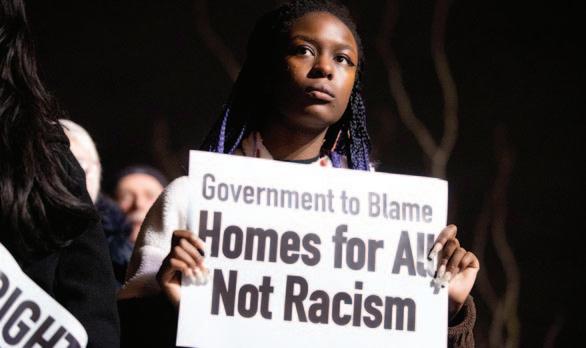

The system and the bosses create an idea of artificial scarcity, i.e. working-class people should be in competition for the scarce resources it provides. The ideas that “Ireland is full” or that there is a need to “house Irish people first” would be ludicrous if they were not so extremely dangerous, as seen in the far-right-incited Dublin riots in November or the racist killing of Josip Štrok or the attack on asylum seekers in Bridgefoot Street Park in April. The poisonous and racist ideas of the far right, all based on lies, need to be challenged at all levels of society, in workplaces, communities, schools or anywhere else they appear.
people
daily grappling with endless “individual” hardships, the local and European elections in June can seem like something of a side show. Whether it’s looming evictions, the epidemic of gender-based violence, rent / mortgage increases, growing food costs, unaffordable childcare, lack of essential medical, mental health and disability services, or the rise of the far right and hate; workers and young people need urgent and radical change.
This stark contrast between the needs of ordinary people and the policies and attitudes of the capitalist establishment was clear in the lead up to the recent Family and Care referendums that were resoundingly rejected on 8 March. Disability activists and carers’ rejection of the neo-liberal version of care in the proposed wording –combined with a broader distrust of the political establishment – decisively shaped the outcome of the vote. This anti-establishment sentiment will likely be reflected in the June elections, with many angry people driven by a determination to give the government parties another hammering.
While Sinn Féin is still the most popular political party according to polls and set to do very well in these elections, its support has plateaued in recent months.
The diminishing enthusiasm for Sinn Féin is undoubtedly due to serious doubts over its ability to deliver real change. From its decision to visit The White House – despite calls to boycott for Palestine, to its shift to the right on issues like immigration, military neutrality etc., those looking for a left alternative are increasingly sceptical.
On the other hand, the biggest shift in popularity is seen in the continuing increase in support for ‘Independent’ politicians. There is a political vacuum to be filled, and far-right and rightpopulist groups and individuals are emerging to take advantage of this by posing as something different to the status quo. But in reality, the only difference these forces offer is more scapegoating minorities and sowing further division, while protecting the interests of the rich and big business just like the status quo.
Fine Gael, Fianna Fail & the Greens are completely out of touch with the aspirations of the majority of ordinary people. There is a huge sentiment for change, but in a society saturated with capitalist propaganda it is not clear to many what the alternative is, or even that there is one. That’s why we need to campaign in these elections for socialist policies that put the needs of workers and young people over needs of landlords, developers and all other profiteers.
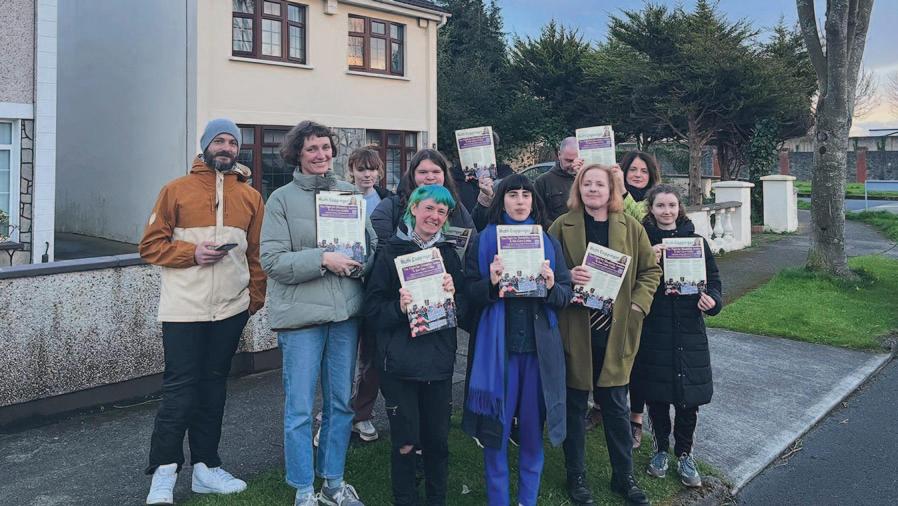
We need an overhaul of this system of extreme inequality, environmental degradation and deepening oppression. The Socialist Party will be standing candidates in areas in Dublin, Cork, Limerick and Galway, where we have been organising on key issues from the cost of living, the housing and health crises, to the genocide in Gaza.
Our candidates will be using the local elections to highlight and demand the need for:
l Publicly funded childcare which is child-centred and free at the point of use;
l Publicly funded free and accessible transport and public spaces;
l Councils must build social and affordable homes on a mass scale, take over vacant and derelict buildings, rent controls & ban evictions;
l Guarantee universal payment for all disabled people and carers;
l Reject racism, sexism and queerphobia – build a united working-class struggle against the far right;
l End the rule of the capitalist market based on private profit. For a socialist alternative that uses the wealth, resources, and collective creativity of society to provide a quality life for all.
Campaigning and pressure delivers: Ableist, Tory-style Green Paper on disability “reform” scrappedBy Stephen Morrison
MASSIVE win for disability activists came on 12 April 2024, when Minister for Social Protection Heather Humphreys announced that the Government would no longer implement the Tory-style Green Paper on disability reform. This is the second big win for disability activists recently after people living with disabilities and carers across Ireland rebelled against the wording of the Care Referendum, inspiring the many others to vote No. In doing so, they handed the capitalist establishment a major defeat.
First and foremost, this victory is a testament to these activists' inspiring, grassroots campaigning. It’s clear that Harris and his weakened government were forced to back down when faced with mounting pressure.
Why was it so important to reject this proposal? Firstly, the people it was supposed to help were not consulted, which goes against the United Nations Convention on the Rights of Persons with Disabilities (UNCRPD). Also, this system was already tried in the UK, with catastrophic consequences that left so many in a bureaucratic limbo and caused misery and despair to thousands, and in some cases, resulted in death.
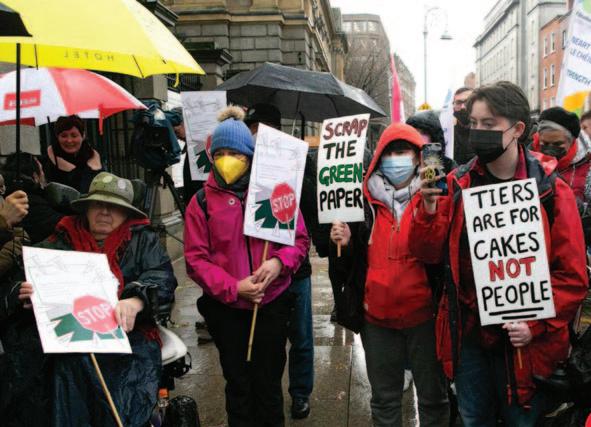
Why was this scrapped?
After being elated at the news of it being scrapped, my initial euphoria has now worn off, and scepticism has crept in. It all seemed too easy a win, and I can’t help but wonder why the Government decided to give in on this proposal. I feel the answer is likely because it won’t cost anything; the Green Paper was only in its infancy and would not be fully implemented for another five years. Very little time, effort, and resources have gone into it.
It is much easier to scrap the Green Paper now than reform the PA hours, provide better accessible transport, provide better education support and therapy, etc. Doing these things would take actual effort from the Government and would cost the Government manpower, time and money. This was an easy way to try to show they were listening. I’m also in no doubt that the mounting pressure from Mick Barry TD and the Socialist Party’s private members motion due in the Dail on 17 April also
1. Ban evictions and slash rents
When the eviction ban was revoked in March 2023, 11,988 people were living in emergency accommodation; in February 2024, that number stood at 13,531.
More than 19,000 people have been handed eviction notices since last year, and 1,543 have been made homeless, not including rough sleepers, couch-surfers, and the “hidden” homeless. We need a ban on evictions and a slashing of rents to affordable levels.
2. Build affordable students accom.
As of January 2024, just under 14,000bed spaces have been delivered, with a further 2,800 (across 11 schemes) under construction nationwide for privately developed purpose-built student accommodation; rents are averaging €1,800 per month. Vulture funds own more student accommodation than UCD, DCU and TCD combined. We need militant action now –an occupation of key campus buildings linking up with workers and a national student strike. Rents for student accommodation should be slashed; we need a massive rollout of student accommodation built by the state.
3. Kick out the profiteers
One of Ireland's biggest building
firms, John Paul Construction, saw its profits surge to €507 million in 2023, from €420.2 million in 2022. The construction industry has been doing all it can to cut across workers impacting their profits; this was shown clearly by the sacking of the four workers in Unite the Union working for Murphy International. The major construction companies should be seized from the profiteers and brought under democratic public ownership.
4. Homes for all not racist poison
The Government has shamefully maintained the system of Direct Provision and has forced thousands of refugees out on the streets. This is shameful. We call for the abolishment of the DP system and the abolishment of racist immigration laws. The myth of scarcity must be absolutely opposed – we demand public homes for all. We need a united workingclass movement that fights against racism, and the robbery and hoarding of the wealth in society by a tiny minority of parasitic capitalists.
5. Build public homes at cost price
The current price for building a three-bedroom house in the Dublin area is €179,000. The government has a €16 billion surplus, which would build 89,385 houses. The Catholic Church currently owns more than €3.743 billion worth of land and
put the Government into retreat. This motion has come about from Mick Barry and Ruth Coppinger’s discussions with people living with disabilities and carers during the lead-up to the Care Referendum and in the time since, and many disability activists cowrote it. This motion droves fear into the heart of the establishment because they can no longer try to control the narrative; they can feel the tide turning.
Keep up the pressure
So, while we should celebrate this win, we should also remember that this was just one issue. We cannot become complacent, and it proves that we need to rally. If this Government is truly listening, then we need to make sure we are shouting. We need to keep the pressure on and keep pushing for better. We demand:
l End all forms of state ableism;
l A universal payment for all disabled people and carers – autonomy and financial independence is a right!
l End continuous assessments for disabled and chronically ill people;
l Make transport and public spaces accessible;
l Guaranteed access to education at all levels;
l An appropriate school place for every child;
l Publicly funded “gold standard” child and eldercare in our communities.
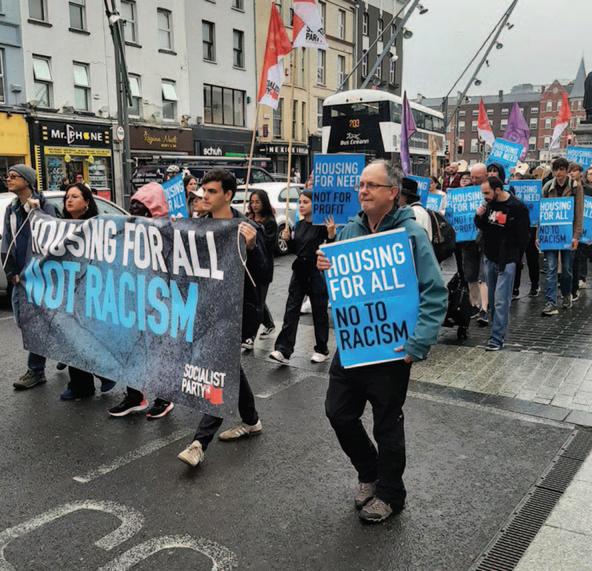
property in Ireland; including 10,000 properties, many of which are vacant.
The Irish billionaire class has increased its wealth by over €34 billion since 2020; this wealth being taken out of the hands of the billionaire
Dirty, discoloured water in Cork – the price of creeping privatisationBy Councillor Brian McCarthy
FOR THE last 18 months, people in communities across Cork City have had to cope with dirty, discoloured water coming out of their taps, washing machines and showers. This is causing financial hardship, ruining of clothes and appliances and genuine fears about public health. This crisis started when Uisce Eireann gave control of the new Lee Road water works to a private company called Murphy Ireland and they used too much of a cleaning agent called sodium hydroxide, stripping decades worth of sediment from the inside of the old cast iron water pipes.
Uisce Eireann’s response to this crisis has been contemptible: they won’t engage with affected communities, they won’t test the discoloured water to determine if it poses a threat to people’s health, and they’ve offered no long term solutions.
Myself and Socialist Party TD Mick Barry have been campaigning on this, going door to door in affected communities, organising public meetings and calling protests. Uisce Eireann are coming under pressure already because since the campaign was launched they’ve announced some limited pipe upgrades in the city and set up a new taskforce. However, these concessions won’t be nearly enough to resolve the issue so we need a real people-power campaign to force action.
In the short term the campaign is demanding testing of the discoloured water, meaningful engagement with affected communities and representation for water workers and householders on the task force. If we want a clean, reliable, safe source of water then we need to abolish Uisce Eireann and return water to the local authorities, with real democratic control by workers and communities. Uisce Eireann was set up as a vehicle for privatisation and the creeping privatisation already taking place has caused this crisis.
Public ownership
class and put towards the needs of working-class people would deliver 83,000 quality houses. The resources are there, what’s missing is the political will to challenge the capitalist class.
Ten years ago, we saw the biggest protest movement in a generation, a mass movement of the working class that dealt the government a historic defeat and beat the water charges. This is unfinished business though, until we abolish Uisce Eireann once and for all and bring water under democratic public control.
SIMON HARRIS'S elevation to ''chief'' is not a sign of strength for the political establishment. In reality, as the football saying goes, “he has a mistake in him''. Harris's tenure is likely to be turbulent, tasked with leading this Government into a general election after being walloped in the referendums and likely being thumped in the local and European elections.
Liz Truss lasted 50 days as Prime Minister in Britain and Edwin Poots just 21 as First Minister in the North. That is perhaps unlikely for Harris, but he definitely will not repeat Enda Kenny's feat – a lightweight leader, lacking in confidence, who reigned in Fine Gael for 15 years and as Taoiseach for six.
Varadkar’s exit
Why did Varadkar, clearly the epitome of arrogance and ambition, suddenly quit? The referendum results brought into sharp focus that things are unlikely to get any better, as the slow historic decline of both Fine Gael and Fianna Fáil took a new twist. A third of the FG parliamentary party will not stand again. While they can pursue careers in the corporate world or return to jobs in the professional middle classes, and collect substantial pensions to boot, huge numbers of young people will be forced to emigrate because of the capitalist policies this government has imposed.
Varadkar was an improvement for the establishment compared to the hapless Kenny, but he never seemed to represent his truer political self. The diplomacy that goes with the Taoiseach's office seemed to prevent him from expressing his explicitly Thatcherite – ‘for people who get up early in the morning, not the welfare cheats’ – stance.
Referendum defeats
Instead, we've had the fiction of establishment parties pretending to be socially progressive for electoral reasons, which helped lead to the fiasco of symbolic superficially progressive referendum wordings, but with no real content or new rights which were roundly rejected as people preferred to vent their overall anger at the Government. Now, the right-wing shift that was an undercurrent is becoming much more pronounced under Harris – hard on immigration, more socially conservative, more stability and security arguments – as they chase the right-populist sentiment and disaffected middle-class voters. The very likely shelving of the Hate Crime Bill is a reflection of this.
The Government wants to put some distance between the referendum defeats and the general election. That points to an election late in the year or possibly even in the new year. It also points towards using the budgetary space to announce measures, even in advance of the budget in October, to try
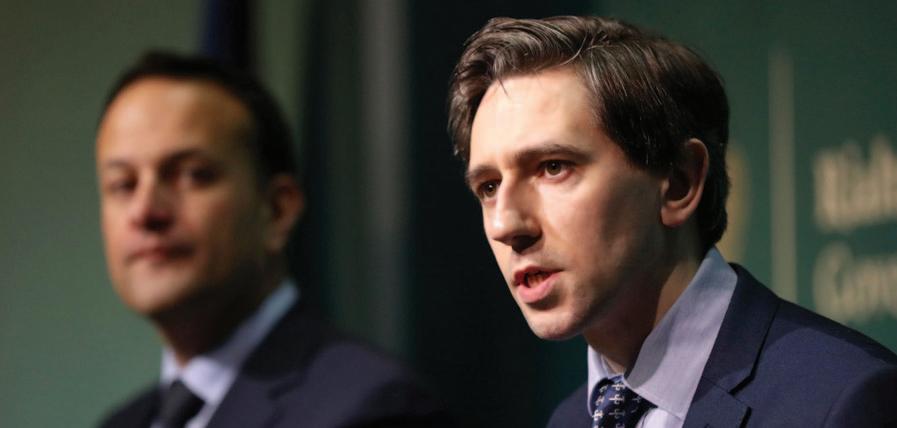
court support. However, it is highly questionable if such an approach can actually halt the undermining of these parties that flows from the unprecedented housing, health and cost of living crises affecting the lives of so many by their policies. The Government parties and Sinn Féin all went down in the first poll after Harris became leader and was planning to present his ''new'' government of four new faces and a reshuffle of old ones at Cabinet.
Rather than representing a boost for FG, if Harris makes gaffes or performs poorly, he can actually hasten its decline. That, in turn, could see him beat an even more right wing path.
Until now, this government has stated it wants to be re-elected as a coalition.
Based on the recent polls and the decline in Sinn Féin, that seemed most likely, even if this time they may need the support of more right-wing Independents. This agreement can keep Sinn Féin out of government despite its desperate desire for office. However, it is possible that if Harris turns out to be hapless, a sentiment could emerge within Fianna Fáil of being more open to the possibility of being in government with Sinn Féin.
Neither the current administration with more backward independents, or Sinn Féin, Fianna Fáil and the likes of
Labour or the Social Democrats, in any way constitute a way forward. They are all committed to operating within the capitalist system which always puts profit before people's needs.
Socialist Party members will be standing in the forthcoming elections linked with People Before Profit – Solidarity. We are organising to build a new mass movement that unites all working-class people on all the key issues against oppression, exploitation and the capitalist system that pushes division and discrimination. In particular, we are fighting to get Mick Barry and Ruth Coppinger in Dublin back into the Dáil to champion and popularise the urgent need for socialist change.
THERE IS a marked increase in the number of horrific hate crimes being reported. Racist, homophobic and transphobic abuse, both verbal and physical, is on the rise.
The far right’s campaign of hate is having an impact in society. It is also being legitimised by politicians in Fine Gael, Fianna Fáil, right-wing independents and even Sinn Féin, who are falling over themselves in taking up the far right’s talking points and endorsing an anti-immigrant narrative.
One example of the political establishment's move to the right is its newfound opposition to the Hate Crime Bill, which all the main parties voted for last year.
What is the Hate Crime Bill?
Hate crimes and hate speech have a real impact on people’s lives and the lives of oppressed groups. Being the victim of this crime is a difficult and shocking thing. It has a corrosive impact, beyond the individual victim, telling people of oppressed groups that they can’t be themselves in public and reinforcing oppression.
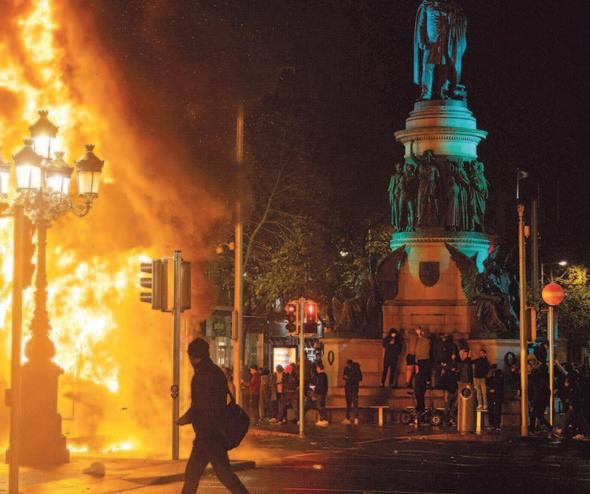
It is correct and just that hate crimes and hate speech are criminalised. It is also right that people who are subject to hate seek to have legal tools and mechanisms that they can call upon to get justice.
However, the Socialist Party did not support this Bill when it was before the Dáil due to serious concerns about its contents. Section 10 of the Bill is particularly concerning. It criminalises the preparation or possession of hateful material, which does not just apply to material that was published but also that which has not been published. There is also an assumption that the material would be intended to be published which puts the burden of proof onto the accused.
The Bill also gives a District Court judge the power to grant, on the word of a Garda of any rank, a wide-ranging search warrant that would allow Gardaí to search homes and electronic devices. This power is wide open to abuse by politically motivated Gardaí or judges.
The Bill’s use of a so-called demonstration test as evidence of hatred rather than a test of a criminal motive, heightens the risk of political abuse. This is a method that is only used in a handful of countries. It means that politically motivated judges and Gardaí could find it easier to tack on a hate crime prosecution to another more minor prosecution.
A Garda would just have to say that they heard the accused use hate speech while committing another offence, and this could be taken as evidence and used to convict. This could be used to stigmatise political movements and activists. The idea of Gardaí and the judiciary using powers to clamp down on protest and opposition is not far-fetched. Capitalist states in Ireland and internationally have a long track record of doing so. The state is not a neutral force in society. It exists to back up the capitalist status quo and the position of those in power. Often, laws that are introduced
supposedly for one ostensible purpose are used in another, political way. We saw Covid laws being used to prevent protests and strikes, like at Debenhams. Similarly, public order laws are regularly used against protesters and workers on strike.
We do support laws being introduced against hate crime and hate speech. We want to see substantial amendments to this legislation especially in relation to state powers. However, to really challenge racism, LGBTQIphobia and hate in all its ugly guises, we can’t rely on laws, the courts and the Gardaí.
We support the calls for the proper funding and roll-out out of the national action plan against racism. This would be a progressive measure, but we need to go further than this – we need to tackle hate at its roots. Those roots lie in the capitalist system which rests on inequality, systematically plunging people into poverty, and precarity. It rests on an ideology of division to justify its rule.
An active movement involving the oppressed that challenges racist prejudices and fights for an end to the housing crisis and for a decent life for all can be the most effective way to push back and challenge racism, division, and bigotry in all its forms.
SEXUAL VIOLENCE and abuse are endemic in our society. They occur at all levels, within families and in different organisations. Jeffrey Donaldson's (the now former leader of the main Unionist party, the DUP) arrest is a horrifying reminder of this. He has reportedly been charged with 11 crimes, including sexual assault. These are described as historic and relate to people who were minors at the time. His wife has also been arrested and is facing charges of aiding and abetting in connection to this.
News coverage of these events has avoided discussing the case, citing the important need to protect the complainants and their identity. The desire to not prejudice a legal trial is of course real and valid. Let us say therefore, it takes a huge amount of courage, bravery and strength to disclose abuse or report to the police – especially when the person you are accusing is a powerful individual. When you know or have a sense of the huge public and personal consequences your report will lead to, the pressure to remain silent is huge.
We send our full solidarity to those who have taken this step in recent weeks and wish them strength in what is surely a gruelling, lengthy and acutely distressing process.
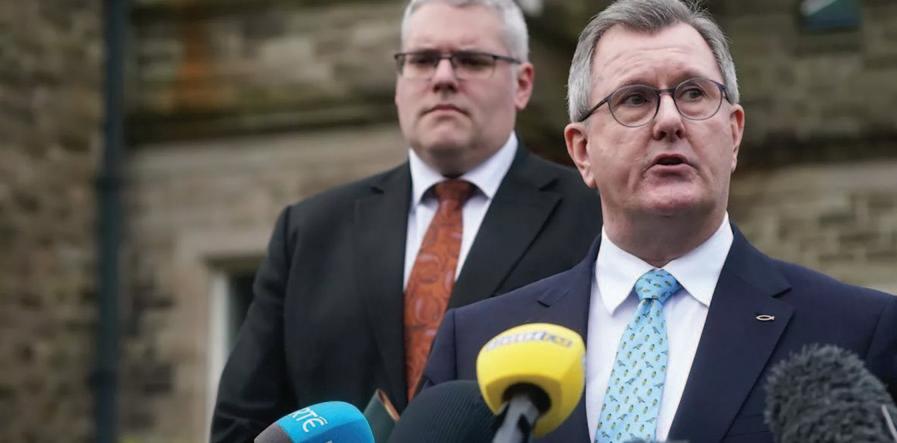
Victim blaming
We wish we lived in a world in which women, victims and survivors of abuse are believed. Survivors of abuse have a variety of reasons why they do not speak about the abuse they have experienced. From the fear of not being believed to the fear of retaliation and the desire not to expose yourself to the potential retraumatisation that reporting and the court process so often constitute.
In the North, less than 10% of reported rape cases lead to charges being read out in a courtroom. How badly
equipped the legal system is to deal with such issues was laid bare by the Ulster Rugby Rape Trial in 2018. The outrage caused by this trial led to the attempt to introduce legal reforms with the Gillen Review, among other things, recommending that victims who now are only witnesses in criminal law proceedings should have the right to their own legal representation. The daily coverage of this trial and the details of the horrifying cross examination the woman was subject to exposed the reality of the court system and was why #IBelieveHer be-
came such a focus during this trial.
With the news of Donaldson's arrest and as the nature of the charges became known, it was made public that he had resigned as leader of the DUP. The party, which on his initiative had just returned to power sharing in Stormont a few week's earlier, suspended him from their membership as did the Orange Order. He retains his MP seat for the Lagan Valley constituency as an independent but is highly unlikely to stand for election in the Westminster elections expected later this year. Even without his
THE CONSERVATIVE Party in Britain is facing a catastrophic election this year according to current polling. At the time of writing the Electoral Calculus “poll of polls” estimates the Tories keeping 90 seats out of their current 376. For context, the Liberal Democrats are set to win 50 seats. This would place the oldest and traditionally most politically dominant party of British capitalism as barely holding on to second place.
Facing a wipeout
Such a dramatic drop in support for the Tories is no surprise. They have been the Government party in Westminster since 2010. In that time they have overseen an administration that has attacked the working class with a vicious programme of austerity, further enriching big businesses and the super-rich, and stoked racism, xenophobia and transphobia. Aware of their impending doom, Sunak has sought to drive through further attacks in recent months, determined to undermine the solidarity movement with Gaza and lay the basis for future Governments to carry out more vicious repression of protest movements and strikes. The current beneficiary of the Tories collapse is the British Labour Party led by Keir Starmer. Starmer’s success is less that he and his party inspire any enthusiasm for real change, and more so that they are simply not the Tories.
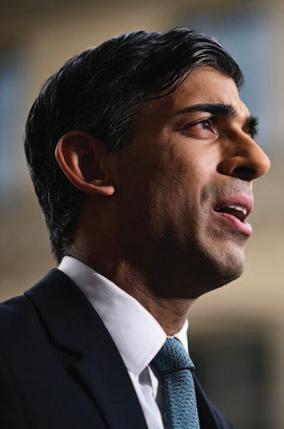
If such a wipeout of the Tories was to occur it would undoubtedly provide deep satisfaction to all who have suffered at the hands of this administration.
However, Starmer has made clear that he will not deviate from the course charted by the Tories in any substantial way. There is barely a difference between Labour and the Tories at this point. The approach of Starmer will be to merely tweak around the edges of the policies the Tories have put in place.
In a private meeting of billionaires and multi-millionaires Shadow Chancellor Rachel Reeves declared: “Labour is now the party of economic responsibil-
ity”; announcing a cap on corporation tax, along with further tax breaks on big business.
Starmer supports genocide
Starmer’s party has lined up with the rest of Western imperialism in their support for Israel’s genocidal war on Gaza. Early on in this genocide, he publicly stated that Israel had the right to cut off electricity and water to Gaza; he suspended MPs for describing the onslaught as genocidal’; and restated his support for Israel’s “right to self-defence”.
While Labour may be doing well in the polls, this stance has disgusted many people, resulting in the resignation of dozens of Labour councillors and prominent figures like Owen Jones. Starmer has rightly faced protests for his disgusting stance – the Labour Party head office was recently sprayed with red paint by Palestinian solidarity protesters.
Labour's ‘New Deal for Working People’ manifesto is thoroughly lacklustre, vague and uninspiring. It promises minimal changes, which are a drop in the ocean when it comes to the impact of the cost of living crisis that workers face. The significant strike action and protest movements we have seen over the past years have demonstrated the power that ordinary people have. Labour has steadfastly refused to support these actions, certainly in any meaningful way.
name on any ticket for the next election there could be a strong challenge to the entire political establishment through strong socialist feminist campaigns that challenge all forms of oppression and the system that is responsible for it.
Socialist feminist struggle
Donaldson's prominent and powerful position in Northern politics, in the Orange Order and generally is a factor. The charges against him highlight again how widespread sexual assault and abuse are in society. In the last few months we have seen a wave of protests in Italy against a horrifying femicide and an explosion of #metoo in the entertainment industry in France.
We fight for a society where #metoo becomes a phenomenon of the past, a world in which misogyny, the sense of entitlement and the ability of individuals to dominate and abuse others is eradicated by ensuring that society is structured differently: on the basis of common respect, cooperation, equality –using the resources we have to meet our collective needs, not to enrich and empower a tiny few. Socialist feminism is not about fighting simply for a reduction in gender and sexual violence – it is about fighting for an end to these social ills. That requires solidarity with victims and survivors as well as united struggle by working class people and young people of all genders against all forms of exploitation and oppression.
No to New Labour – Mark Two
Many trade union leaders in Britain have retreated from the scene of industrial battle, desperately banking that a Labour government will bring about change – a starkly misplaced hope.
Starmer’s party is New Labour – Mark Two: unashamedly committed to the rule of capitalist status quo and the inequality and oppression that invariably
goes with that. But unlike the Blair administration elected 1997, his government is taking power in the age of disorder, which will be devoid of any honeymoon period.
The time to build a new organisation for working-class people is now – one that’s based on mass struggle and fights for a socialist alternative.
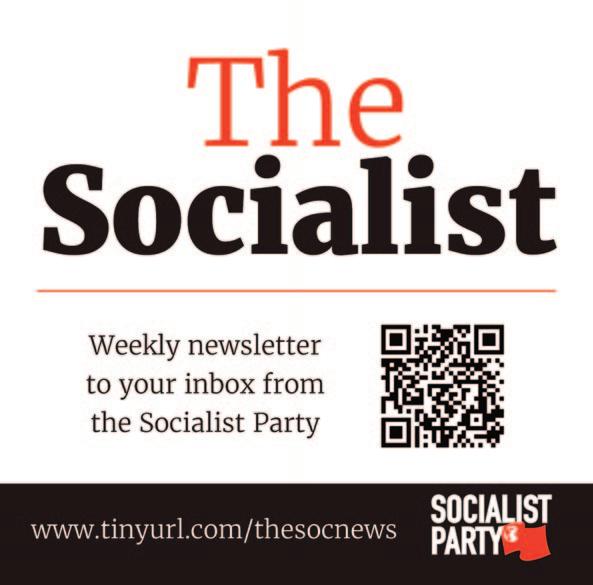
FROM THE origin of the phrase “Bread and Roses” in a speech by suffragette Helen Todd in 1911, to a poem by James Oppenheim inspired by the speech, to the setting of the poem to music by Mimi Fariña, the power of idea of Bread and Roses has shone through for over a century. Appearing on countless picket lines, feminist rallies and festivals, in the 2014 movie Pride and beyond, it remains an important call for the workers’ movement.
By Summer ConneelyF
ROM
THE origin of the phrase “Bread and Roses” in a speech by suffragette Helen Todd in 1911, to a poem by James Oppenheim inspired by the speech, to the setting of the poem to music by Mimi Fariña, the power of idea of Bread and Roses has shone through for over a century. Appearing on countless picket lines, feminist rallies and festivals, in the 2014 movie Pride and beyond, it remains an important call for the workers’ movement.
The central meaning of Bread and Roses can be seen simply in the poem’s line, “Yes, it is Bread we fight for, but we fight for Roses, too,” emphasising that we do demand the basic necessities of life, but that alone is not enough. We also demand dignity, respect, and the full enjoyment and fulfilment of life beyond that. With that meaning all too relevant today, it’s worth looking at the event most commonly associated with the phrase: the 1912 Lawrence Textile Strike, often referred to as the ‘Bread and Roses Strike’.
The American Woolen Co. mill in Lawrence, Massachusetts, was a gruelling place for its workforce. With most workers being immigrant women and al-
most half being girls between the ages of 14 and 18, the town of Lawrence had the fifth-highest child mortality rate in the US, with one-third of workers dying before reaching 25. Additionally, the workers were completely divided along ethnic lines by the bosses. With the imposition of a reduction in hours and pay, the already struggling workers faced an intolerable reduction in living standards. Upon finding out about the pay cut, a large group of Polish women workers walked out, quickly uniting the rest of the workforce, and later, with the help of organised trade unions, a strike committee was formed.
Unfortunately, the United Textile Workers, a trade union to which most of the workers were affiliated, did not support the actions of the workers. Instead, the leadership fell to the Industrial Workers of the World (IWW), a militant labour union that sought to organise all workers in “One Big Union”, regardless of their background. The IWW helped the workers put forward their demands: a 15% wage increase for a 54hour work week, double pay for overtime work, and no discrimination against workers for their strike action. In response to the 27,000-strong strike the city and state government collaborated with the mill owners to try to crush the workers.
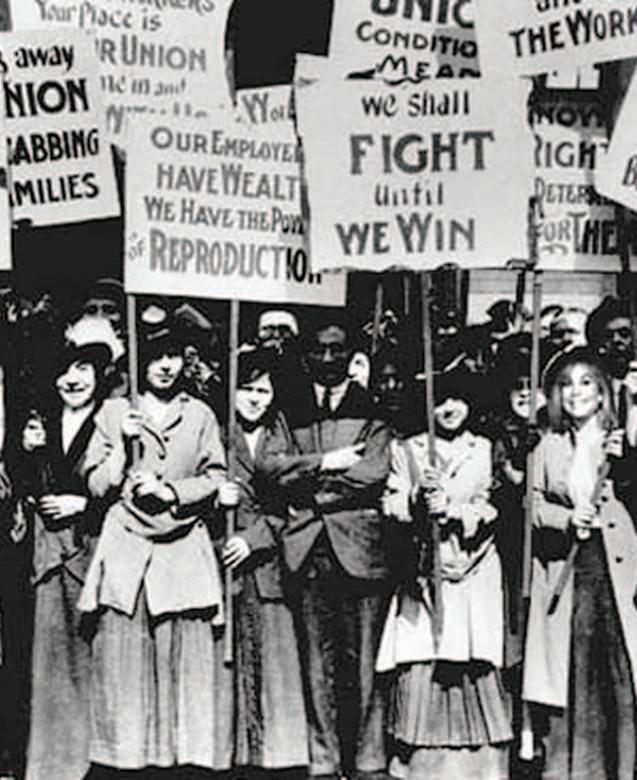
The ruling class resorted to more desperate and violent measures as support grew for the strikers. The Mayor of Lawrence ordered the city militia onto the streets, the Governor of Massachusetts brought out the state police, the mill owners used fire hoses on the picketers, and all those who defended themselves were imprisoned. In total, three people were murdered in retaliation for the strike action. Additionally, there were attempts to frame the strike leaders for the murder of a young striker, and later, on the orders of the mill owners, bombs were planted in another attempt to frame the strikers.
Despite the violence, intimidation and repression, the workers continued their struggle and wouldn’t submit. In fact, in many cases, the repression only strengthened their solidarity with each other, and strengthened the solidarity that workingclass people from across the US showed towards them. Their community had set up soup kitchens and food distribution networks for the strikers, medical care was provided by volunteering doctors, and funds were raised across the US by ordinary working-class people who wanted to show support to their fellow workers. The unshakeable resolve of the workers’ solidarity forced the bosses into conceding on many issues. While they didn’t have all of their demands met, their actions represented a victory, not just for themselves, but for the working class in general, with a raising of conditions across the US textile industry.
As the US continued on its path to becoming the centre of global capitalism, only increasing its opposition to workers’ struggles, the Bread and Roses strike remained an incredible inspiration in the midst of this. It represented the embodiment of solidarity and struggle against intolerable capitalist exploitation. One element that shines through for today is just how important it is to stand behind the most oppressed elements of the working class, and not to shy away from tackling all forms of oppression.
Organising minority workers
In fact, a reason that the more conservative elements of the trade union movement didn’t support the Lawrence Textile Strike was partly due to their belief that a workforce made up almost entirely of immigrants and women could not be effectively organised. Unfortunately, this attitude still persists today, albeit put in less crude terms or dressed up in leftist-sounding rhetoric. With migrant and women workers often treated as the ‘most exploitable’ groups of workers by the ruling class, showing solidarity is even more vital – primarily to show support for some of the vulnerable workers, but because their fight and their victory will raise conditions for all workers.
The Bread and Roses strike demonstrates the struggle not just for economic improvements but on a more fundamental level, a struggle for dignity, for workers to be treated as human. Indeed, at the heart of so many struggles is the desire to be treated as a human being, that nobody can use their power over you, oppress you, treat you as if you are less than them. This is a central tenet of struggles for workers’ rights, feminist movements, trans rights, struggles for racial equality, disability rights, migrant rights and many other struggles. So when we say Bread and Roses, that is what we struggle for, and that is the spirit we’re drawing from.n
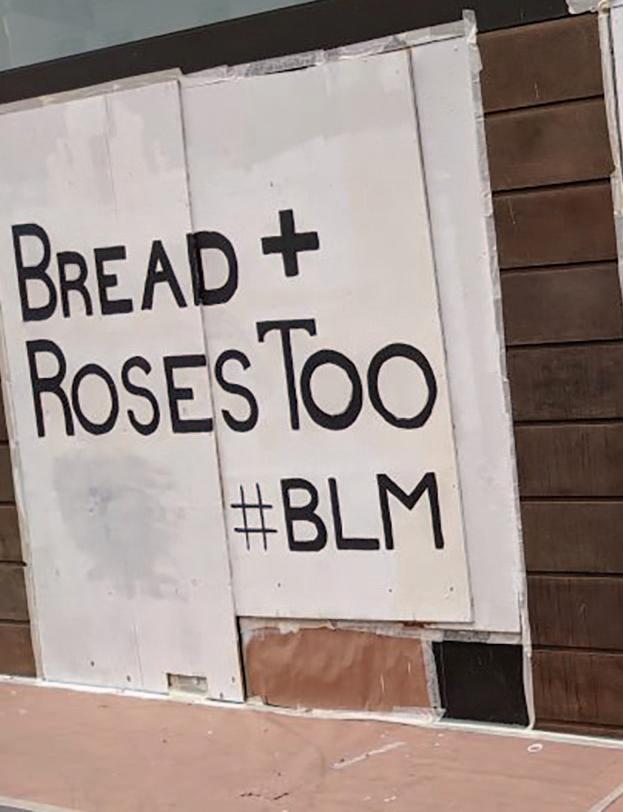
A“CIVIL war without guns” aptly describes the struggle against pit closures in Britain 1984-85, which had the potential to bring Margaret Thatcher's right-wing government toppling down.
This was a watershed event. British capitalism was in long-term decline, and the Tories planned and picked their moment. They hoped to inflict a terminal blow on the trade union movement, which had stood in the way of the bosses' attempts to claw back hard-won wages and conditions built up during the post-World War Two economic boom that lasted from 1945 until the mid-1970s.
State repression
For an entire year, the battle waged between the working class, using weapons of strikes, solidarity and mass action, and the ruling class, using the full force of the state – the many-headed hydra of new anti-trade union laws, a militarised police force, the army, agent provocateurs, spies, the courts and media. Repression became the order of that time, with some areas in Nottingham, Yorkshire and Scotland turned into virtual police states.
The Tories expected a quick victory given the craven lack of fighting will amongst the right-wing Trade Union Congress (TUC) and Labour leadership. They had not reckoned on the courage and determination of the mining communities to defend their lives and livelihoods, nor on the solidarity they inspired from the working class
across Britain and even internationally.
A huge support network mushroomed, connecting pit villages with workplaces, women’s support groups, trade union branches and trades councils, and local Labour Party branches (the party still had important connections with the working class and had an important and sizeable grassroots leftwing opposing its pro-capitalist leadership) and local support groups.
Inspiring solidarity
Women played a vital role in the strike and not just in organising food and welfare. Thousands of women from the pit villages joined picket lines and toured Britain and Ireland to explain the miners’ cause.
Lesbians and Gays Support the Miners (LGSM) was formed to build practical solidarity for a pit village in the Welsh valleys, as depicted in the excellent 2014 film Pride. This was particularly courageous given the high point of the AIDS crisis, which fueled an LGBTphobic moral panic. They showed that the media vitriol and police aggression experienced by the miners was not dissimilar to that meted out to the LGBT community. It was a great example of how prejudice can be challenged through common cause and action.
The Tories would not be allowed to starve the miners back to work. Convoys of trucks could be seen driving food, clothing, children’s toys and desperately needed funds to mining areas. Bucket collections outside supermarkets were to be seen everywhere. Visits were made to local factories and workplaces to set up regular collections and levies.
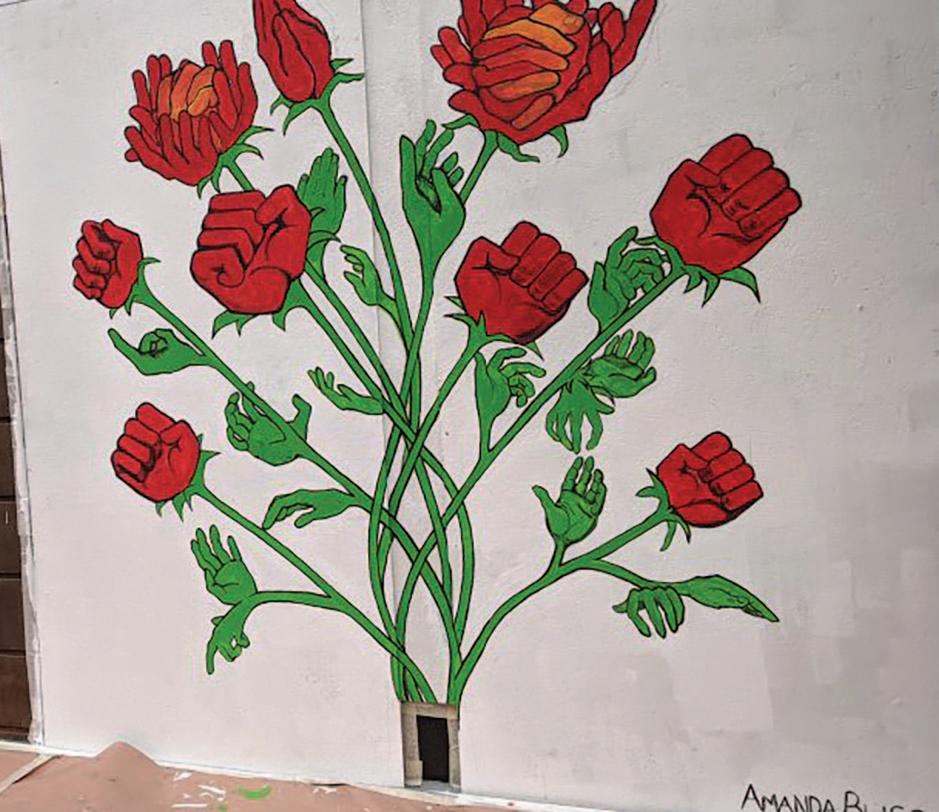
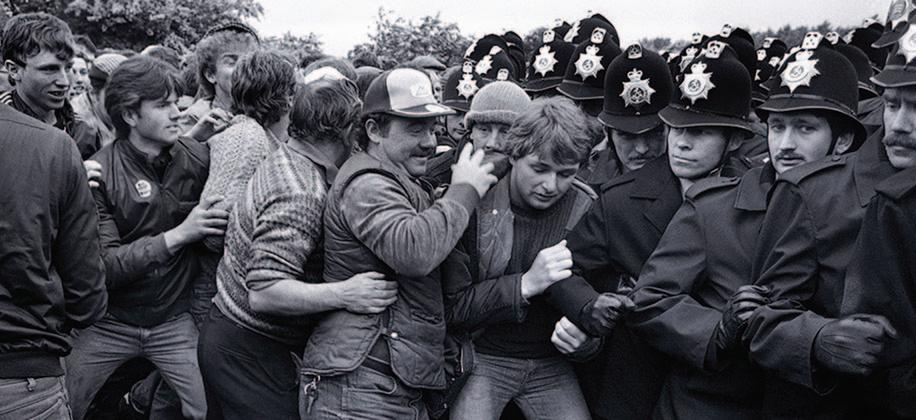
Some Labour Councils set up canteens, provided free school meals and suspended rent payments.
Important solidarity action was taken by seamen, rail and transport unions who refused to move coal, risking their own jobs. There were many smaller actions such as the walkout at Porth bus depot when management refused hire to the local NUM branch. Two hundred school and tech students in Port Talbot, Wales, joined a picket of the local steelworks in the face of police harassment and orders from their head teacher to return to school.
Illegal solidarity action was already taking place in the face of the anti-trade union laws. The travesty was the refusal
of the Labour and TUC leadership to match this fighting spirit and to organise a united campaign of solidarity action leading to general strike action.
The potential for united action was there. Dock workers engaged in a threeweek strike over the use of scab labour to move coal at the docks. The very month the miners’ strike broke out, the battle of Labour Councils against local government cuts and privatisation was reaching its height, most notably with the Militant-led (forerunner of the Socialist Party’s sister party) Liverpool City Council. Other sections, such as the rail unions, had pay claims in.
A struggle betrayed Rank-and-file pressure was needed to circumvent the dead-hand of right-
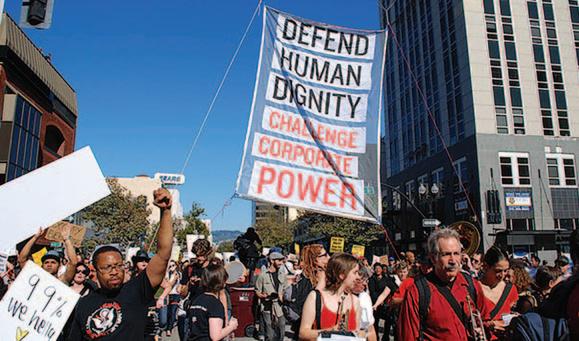 By Emma Quinn
By Emma Quinn
DURING THE recent referendums on Family and Care a powerful grassroots movement emerged. Led by disability activists and carers, the movement demanded rights, rejected the neo-liberal version of care in the proposed wording, and exposed the cruel treatment of people with disabilities or chronic illness –and those who care for them – by the Irish state.
In 2022, Social Justice Ireland reported that the “working poor” had increased by 40% to 134,000, and that half of those households included a person with disabilities. Disabled people are twice as likely to be homeless. Despite these realities the government’s ‘Green Paper on Disability Reform’ proposes a tiering of people with disabilities. The purpose is to force disabled people off state payments and into unsuitable work. This would cause immeasurable stress, anxiety and depression. Suicide mong disabled people has rocketed in Britain after a similiar model was adopted.
The current system already traumatises and dehumanises disabled people by forcing them to constantly prove their disability via continuous reassessments, means testing and arduous applications for medical cards and payments. It is a constant battle to access the most basic care – even harder for people from minority ethnic groups, the Traveller community, people of colour and LGBTQI+ people. The outcry for disability justice has resonated broadly and has exposed the sharpest edge of a far reaching care crisis that exists today.
wing leaders. The Militant-led Broad Left Organising Committee organised a conference which brought together 2,200 delegates from 20 union Broad Lefts including 100 miners, but unfortunately this didn’t have sufficient reach to alter the course of the strike.
The militancy of the working class shown during this struggle turned the ‘new realist’ ideas of the Labour and TUC leaders on their head. Such ideas were just feeble excuses to abdicate from leadership. If there is one lesson that shines out from this period it is the need to build strong rank-and-file organisations to democratise the unions and to replace faint-hearted leaders with lions who will match the courage and fighting capacity seen during the miners’ strike.n
The “care system” should incorporate physical and mental healthcare, childcare, eldercare, social care, and education if taken holistically. Right now, the whole system is broken.
In fact, Ireland has one of the worst health systems in the Global North. It is chronically underfunded and understaffed, with a constant trolley crisis and over 100,000 children and young people on waiting lists (Irish Hospital Consultants Association). Public patients with cancer or rare illnesses can wait up to two years for medication or treatments, while those who can pay for private care fare much better.
During the pandemic, the profits of major childcare providers trebled, yet childcare is still out of reach for many. Currently, there is a wait of up to three
years for creche places! Eldercare too is totally dominated by “for profit models” run by private companies and international equity firms.
In education there are widespread teacher shortages resulting in higher class sizes, reduced subject availability and a serious reduction in school places. Alarmingly, an estimated 20,000 children are waiting for needs assessment across the country.
Despite massive profits being made in the care sector, and the importance of public workers like nurses and teachers, these mainly women workforces are underpaid and overburdened.
Though we have never had adequate public care, the crisis intensified during the bank bailout / austerity era, when public funding of health and social care was decimated. Covid-19 made the bad situation worse. Successive governments have consciously prioritised the profits of big business over the health and well being of ordinary people and the effects are immeasurable.
Making ‘care’ a commodity
In 2023 the World Health Organisation reported that more than half of the world’s population, 4 billion people, can’t access essential healthcare, and another 2 billion people face severe financial implications when paying for health services. The reality is capitalism doesn’t care, and never will.
Not content with making obscene profits from basic human needs, the unpaid care work that takes place every day in our homes and communities saves the global economy $11 trillion a year (Oxfam) – twice the size of the global tech sector. The system has been successful in normalising the feminisation of care, using sexism and the gender binary to exploit low-paid and unpaid carers.
Capitalism in its ruthless pursuit of profit makes care a commodity. Quality care is a luxury available only for those who can afford it.
But it doesn’t have to be like this. The wealth, technology and resources exist to develop a care system based on human need. Socialists stand for a complete transformation of the care system, an end to capitalism and all of the inequality, injustice and oppression that comes with it. We need to build active movements of young people, people of colour, LGBTQI+folk, fighters for disability justice, trade unionists and working-class communities to build a socialist challenge that can deliver the type of care we need and deserve.
AS THE genocidal war passes its six month famine approaches northern Gaza. People there are currently “surviving” on an average of 245 calories a day. Dr Umaiyeh Kammash, director of Juzoor, has described what he’s seen there as “hell on earth”, as many children show signs of acute hunger: “their bones are becoming visible and they’re very thin. Many are also suffering dehydration, diarrhoea and infection.” Make no mistake, this horror is a result of detailed military calculations.
Imperialist complicity
Vitally, the global protest movement is resisting the Israeli State and its allies’ attempts to normalise this obscene, supremacist violence. Despite some verbal backtracking, The White House has supported these crimes, including the expulsion of UN aid agencies from the Strip. The US has made 100+ weapons sales to Israel since October, including tanks and thousands of bombs. The role of Western imperialist powers in the last 200+ days of genocide exposes the rottenness of their capitalist order.
The US and European ruling classes have long nurtured the Israeli State as their “strategic asset” in the Middle East – a state that guarantees Western imperialist domination of the region's natural resources and cheap labour. In the 1980s, US Secretary of State Alexander Haig even stated his view that “Israel is the largest American aircraft carrier in the world that cannot be sunk.”
The obscured truth
Israeli airstrikes have destroyed homes and infrastructure, displacing almost two million people. Right now only nine of Gaza’s 36 hospitals are even partially functional. With the complicity of the Western media, the true extent of the horror has been hidden from the broader public outside Palestine.
The Israeli Occupying Forces do not allow foreign journalists to enter the enclave and they have killed 103 Palestinian journalists over 150 days. Gazan journalist Ibtisam Mahdi has travelled from place to place with her young family seeking refuge while mourning the death of her brother, whom Israeli soldiers killed. Much of her harrowing experience is all too typical for Gazans at the moment:
“Recently, my daughter fell ill and lost half her body weight… Aside from food, we lack gas and electricity, relying instead on firewood to prepare our meals and to heat up canned food… The number of journalists that have been martyred in the past six months is so high that friends have shut their doors on my family because they didn’t want a journalist staying with them, believing us to be a target.”
Despite the attempted cover-up of the genocide, the global solidarity movement has been incredibly consistent for the past six months. Street protests have remained strong from Britain to Indonesia. Workers have taken strike action in India, Canada, Belgium, Italy and the Spanish State against the manufacture and transportation of
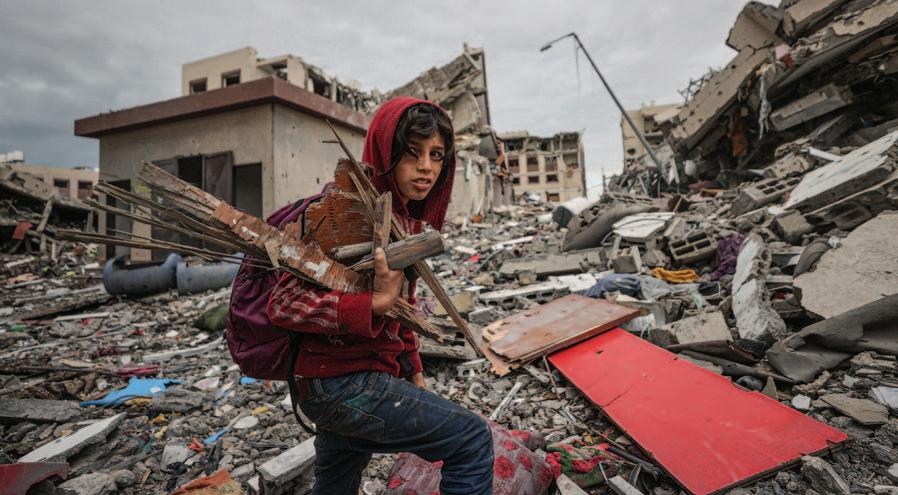
weapons destined for Israel.
Dozens of pro-Palestinian protesters were arrested in Istanbul and Cairo in April, and 1,500+ have been detained in Jordan since the genocide began. A renewed wave of pro-Palestine protests has frightened the Jordanian authorities and the neighbouring Kingdom of Saudi Arabia who fear that this movement could spark a revolutionary struggle that could topple their own authoritarian rule.
The collective power of the Palestinian masses in the West Bank and East Jerusalem could deliver serious blows to the Israeli state. The working classes of Egypt, Turkey and Iran could
reinforce this struggle by waging battles against their own ruling classes as well as Israel. Workers across the wider region of North Africa, the Middle East and Western Asia have a shared interest in ending the exploitation, oppression and war that capitalism fosters there. The immense wealth and resources of the region should be seized and brought into public ownership and the democratic control of the masses.
Opposing the occupation
Thousands of Israeli citizens have protested to pressure the government to negotiate the release of Israeli hostages in Gaza. Many believe that the Israeli
political establishment wants to prolong the war for its narrow interests. An Israeli teen, jailed for refusing the military draft, recently spoke to +972 Magazine: “Since the beginning of the war, I felt obligated to act… I think we must stand in solidarity with Gazans and with the Palestinians in general.”
Israeli capitalism has only delivered a society based on perpetual insecurity and war. Although it seems like a distant prospect now, the conditions do exist for a united working-class movement to throw this capitalist system that breeds Islamophobia, antiSemitism and violence into the dustbin of history where it belongs.
‘Genocide Capitalism’ is how writer Naomi Klein has aptly referred to chilling reports of the Israeli State’s vile ambition to export AI-powered military technology to new markets.
By 2022, the Israeli State was already the tenth largest weapons exporter in the world, selling $12 billion worth of arms. Today, AI start-ups in Israel that produce murderous programmes made specifically for the genocide of Palestinians are working closely with the IDF to maximise profits from the increasing militarisation globally. Axon Vision CEO Roy Riftin even gloated about his company’s “battle tested” AI system, sickeningly referring to its role in the murder of tens of thousands of Palestinians as “feedback” for the development and trade of lethal autonomous weapons.
The Palestine laboratory
A range of AI technologies are now being brutally tested out on Palestinians, but the development of a secret AI-powered database called ‘Lavender’ is deemed central to the Israeli State’s devastating colonial project.
A new investigation has revealed that Lavender has played a key role in the unprecedented genocidal bomb -

ing of Palestinians in Gaza, generating 37,000 people as potential targets at its height. The IDF gave sweeping approval for soldiers to adopt Lavender’s kill lists, with no requirement to check why it made certain choices or to examine the data on which they were based. IDF soldiers would operate as a “rubber stamp” for the machine’s decisions, devoting just 20 seconds to each
target before authorising a bombing. This was despite knowing that the system makes errors in 10% of cases.
For every junior Hamas operative marked by Lavender, IDF officials authorised the killing of up to 15-20 civilians, and for every senior Hamas commander marked, they authorised
the killing of more than 100 civilians. The IDF has also used unguided missiles, which have destroyed entire buildings, causing significant casualties, with one soldier saying: “You don’t want to waste expensive bombs on unimportant people.”
Other automated systems, including one chillingly called ‘Where’s Daddy?’, was used to track targeted individuals
and carry out bombings only after they had entered their family home.
The proliferation of AI and its now indispensability to many sectors, most appallingly in Israel’s war industrial complex, is completely in line with the cold logic of capitalism. Automation has the potential to improve conditions for ordinary people but under this system it is a tool used by the capitalist class to reduce the cost of labour in supermarkets, tech companies and now, barbarically, in genocide.
The revolutionary socialist and antiimperialist Rosa Luxemburg understood that capitalism will stop at absolutely nothing to preserve itself, be it “by occupation, by theft, by extortion, by extermination, by taxation, by the supply of cheap consumer goods, by the appropriation of natural resources and everywhere by the use and the threat of military force.”
The working class and oppressed of the world must stop at nothing to continue and strengthen our solidarity with Palestinians. We need to step up the marches, workers sanctions, strikes, targeted boycotts and crucially, organise ourselves into a united socialist force capable of taking on this predatory system in all of its cruelty.
INA decision that has major ramifications for the whole trade union movement and the right to strike, the Supreme Court ruled on 6 March that the injunction granted to mechanical contracting giant Jones Engineering last year was a bad order and should be disbarred. It further ruled that the defendants, Unite the Union and three of its leading shop stewards, had acted legally and were entitled to the protection of the 1990 Industrial Relations Act.
The injunction was granted in the aftermath of historic strike action by mechanical workers organised by Unite the Union pursuant to the restoration of the first hour of travel time, which had been snatched by the employers in midst of the 2008 economic crash. In the period since then, Unite has been forced to jump through hoops navigating the state’s restrictive industrial relations architecture before legally balloting its members for industrial action. Eventually the path was cleared for significant strike action which took place on 10 March 2023, shutting the prestigious Intel and Pfizer projects in Dublin and Kildare. Fearing an escalation of the dispute, the employers sought and were granted injunctive relief.
It was a strange moment for the trade unionists gathered in front of five Supreme Court judges. Normally when workers and their unions find themselves in such a setting the scales of jus-
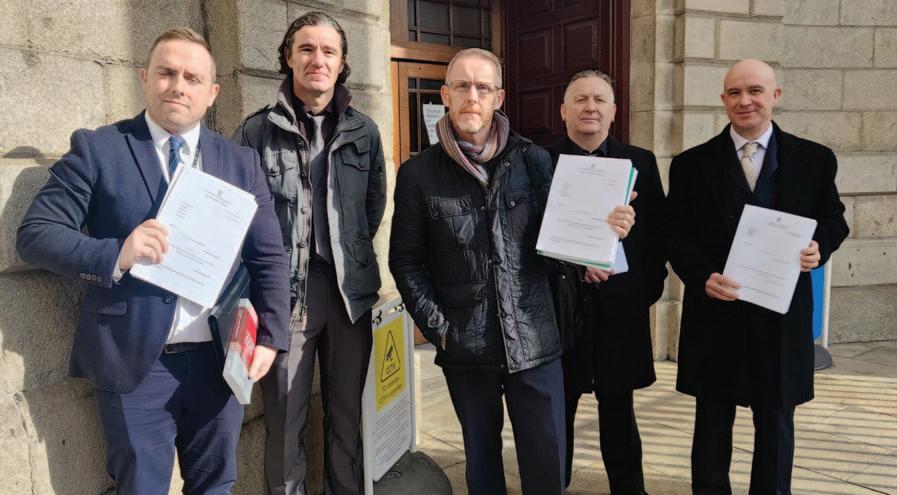
tice tip in favour of the bosses. There were no representatives from other trade unions despite the landmark nature of the judgement. Even the employers declined to attend. In a session that lasted little more than 15 minutes, the five judges exonerated Unite. This was an enormous win, particularly for the three reps who were attached to the injunction and singled out for trade union activity.
But the significance of the outcome goes far beyond the specifics of this case
and sets a precedent that significantly strengthens the democratic right of association and the right to withdraw labour in a bona fide trade dispute.
Ruling will serve struggles
Whereas the 1990 Act only required workers and unions to ballot their members for action and to serve seven days notice to the employer, the ‘disputes procedures’ contained in many local agreements required unions to attempt to resolve the matters at dispute
THIS YEAR I attended the Teachers of Union of Ireland (TUI) Congress as a delegate, a union that represents over 19,000 members in secondary, higher and further education.
Disappointingly, a number of motions on pay and industrial action were struck down because of the terms already imposed by the new public sector pay agreement. Indeed, there was a lingering air of discontent in light of the new pay deal, and an overall impression that teachers were locked into terms and conditions, some of which, such as major curriculum changes, we have had little or no say in.
Long hours, recruitment & burnout
However, just like previous years, pay, long hours, burnout and recruitment (or lack thereof) were major themes. In the TUI’s own survey, 93% of teachers believe that the challenges faced by young people have increased in the last five years. This is an acknowledgement that schools are tasked with meeting more and more needs with less staff and resources.
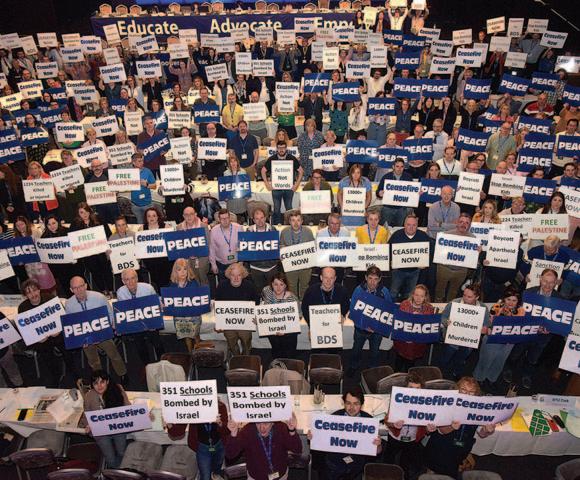
One key aspect of this issue, discussed passionately at Congress, was the proposed change to the Assessment of Needs model, which is carried out by HSE specialists to certify that a child is entitled to extra support. In an effort to manage the enormous backlog of children awaiting an AON (a shocking 9,000 nationally) changes being proposed by the government would mean that
teachers would play more of a role in defining the kind of educational needs required by individual children, filling out extensive forms on their file. This measure would obviously have serious workload implications for teachers, on top of the lack of critical expertise required.
through local engagement with employers, then advancing to the WRC and then advancing to the Labour Court – dragging out the dispute for up to nine months in some cases. Such wars of attrition naturally favour the bosses.
However, the Supreme Court ruling for the first time brings clarity to the relationship between the constitutional rights of association and strike action, and the terms under which a disputes resolution procedure can apply. Essen-
tially, the judgement determined that Unite had met its obligations both under the terms of the disputes resolution procedure and the 1990 Act. However, the judgement went further and determined that, even if Unite had not exhausted the disputes procedure contained within the SEO, it would still have had the right to strike had it fulfilled the obligations of the 1990 Act.
The effect of the judgement, therefore, is to render disputes resolution procedures redundant, meaning a union can take strike action as long as it ballots its members and serves seven days notice.
The urgent need to rebuild
No trade unionists are cavalier when it comes to disputes, and no worker goes on strike without seriously weighing up the pros and cons. But trade unions today need to be advocates for industrial action. There needs to be a break with the social partnership mindset of only pursuing demands through the channels of the WRC and the Labour Court.
The power of workers derives from the essential role their labour plays in the economy, particularly in the production of surplus value, from which all profit is derived. This power needs to be organised and leveraged in order to deliver wins for workers. As Unite regional secretary and Socialist Party member Susan Fitzgerald said: “the more strike-ready workers are, the more talk-ready employers are.”
In his speech addressing the Minister for Education, the union President received a standing ovation when he mentioned the much reviled “Croke Park Hours”. Scandalously, these extra working hours, which were brought into the public sector during the austerity years, have since been built into successive pay agreements.
Industrial action win victories
However, we are now in an era of budget surpluses and it makes even less sense for the union leadership to even consider allowing such demeaning conditions to remain. Nor can the state any longer afford to maintain conditions that are further exacerbating the exodus of Irish teachers overseas. According to the TUI’s own survey, 70% of schools reported vacancies that no teacher applied for.
Meanwhile, in Northern Ireland, teachers have just won a pay rise of up to 24.3% on the back of 18 months of industrial action. Clearly, the gains are there to be won by mobilising the power of workers. The present labour shortage in schools is something that our union leadership must leverage to get a better deal for teachers. This must include, at a
minimum, real pay equality
(especially for those returning from teaching overseas), a reduction in workload and admin, as well as an end to cruel and pointless extra hours brought in during a bygone era.
Far-right and Gaza genocide
This year there was also a growing awareness of the need to take the impact of the far right seriously in education. Delegates called for more protection for teachers engaging in the new sex education curriculum and the need for urgent anti-racist training for both students and staff. There were appeals to the trade union movement to mobilise its membership and fight for broad social demands that would cut across the racist division we are currently seeing in the present climate.
Solidarity with Gaza was also a major feature thanks to pressure from activist groups within the union. When both the Minister for Further Education and the Minister for Education spoke, teachers held up signs such as “Actions not words” and “351 Schools Bombed”, highlighting their disgust at government leaders' inaction in the face of mass murder of their colleagues abroad.
 Reviewed by Keishia Taylor
Reviewed by Keishia Taylor
THE GROUNDBREAKING
documentary Israelism follows the stories of two young American Jews, Simone and Eitan, who were raised with Israel at the centre of their Jewish identity. But when they witness the occupation firsthand, they decisively reject the Zionist narratives fed to them since birth and speak out for Palestinian liberation. The documentary, filmed in 2016, was released shortly before the current genocidal onslaught on Gaza, and has never been more relevant for understanding such widespread support for an apartheid state.
The idea of Israel looms large in the upbringing of US Jews, in schools, synagogues, communities, families. Many young US Jews are taught that, in the words of one Jewish educator, “Judaism is Israel and Israel is Judaism.” While Israel’s very existence is presented as an insurance policy and a response to the very real trauma of the Holocaust, young people describe being taught that Israel was a “land without a people.” Palestinians are not discussed in schools, except as people who want to kill Jews.
Organisations like ‘Birthright Israel’ arrange trips to Israel for young Jews. Teenagers spend time on Israeli army bases, wearing military uniforms, re-
sponding to real IDF commands and pretending to be soldiers. These activities are designed to recruit US teenagers to the Israeli military, one of two preferred paths for young people loyal to Israel.
The other is to act as “soldiers abroad” and to fight the ideological battle defending the Israeli State from the supposed “lies” it is subjected to. This is particularly the case at US colleges, with ‘Hillel’ branches on almost every campus. Simone recounts being instructed to intervene “emotionally” against an “anti-Israel” motion at student council, but words like “occupation” and “settlement” baffled her and her Jewish peers. Despite completing “all the trainings,” she was ill equipped to respond to the questions posed by Palestinians and their supporters.
Determined for answers, Simone visited Palestine and was horrified to hear from Palestinians about being displaced, beaten and humiliated daily. She witnessed the stark reality of the apartheid system, where a visiting US Jew has more rights than Palestinians over their whole lives.
Eitan, an American former-IDF soldier, described the cruelty with which the occupation is enforced day to day, and detailed human rights abuses casually perpetrated by IDF soldiers. The utter dehumanisation of Palestinians is justified by the idea that Jews can only
Includes articles on:
l 25 years on: Has the Good Friday Agreement delivered?
l Sinn Féin, PBP & the question of a left government
l Anti-oppression struggles & the revolutionary process
l What does ChatGPT mean for workers?
l 75 years since the founding of the NHS
l Germany 1923: Lessons of the lost revolution
l Reviews of The Myth of Normal, Close To Home and The Patriarchs: The Origins of Inequality
€4 / £4
Get a copy from any Socialist Party member or order online or subscribe at: socialistparty.ie
 By Michael O’Brien
By Michael O’Brien
be safe if Palestinians are not safe.
The film highlights the connections between Zionist organisations and the political establishment, with US capitalism reaping huge benefits from the “only democracy in the Middle East.” Millions of dollars are poured into branding any criticism of the Israeli State as anti-Semitic, yet genuinely anti-Semitic forces, such as Neo-Nazis, white supremacists, and conspiracy theorists, are rising.
Since the inception of Israel, there have always been Jews standing up for Palestinian rights, but their numbers are growing. Young American Jews are sickened and infuriated by how they were indoctrinated saying, “you mobilised me to be a soldier for Israel, you lied.”
Despite the horror of apartheid and the sinister manipulation of young people, this documentary is ultimately inspiring. Young Jewish people are searching for answers, rejecting propaganda, challenging others in their own community, and standing in solidarity with Palestinians. It shows the drive for justice inherent in the majority of humanity and the willingness to courageously act in solidarity with the oppressed. The film ends with a commitment to building a movement for Palestinian rights and solidarity: “May you be blessed to know you’re not alone. Let’s get to work.”
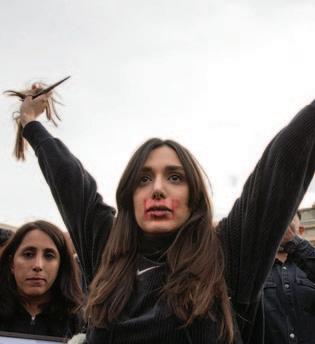
Mainstream commentary on economic crises tends to focus exclusively on the special features that may have tipped what was a slowdown in the economy into a full blown recession, or some particular event that precipitated a more spectacular economic crash.
For instance, the Great Recession of 2009 is typically discussed in the context of the subprime mortgage crisis. Similarly, the 2001 ‘dot.com bubble’ bursting and the 1973 oil shock are essentially recalled as triggers for those particular recessions. Even where there is validity in these analyses as descriptions of how the crisis happened, they don’t actually explain why it happened. It suits the ruling class to have recessions spoken of in these terms, as if they were unfortunate accidents, because it points away from a Marxist view of capitalism that understands periodic crises as built into the very DNA of the system.
To understand why crises arise under capitalism it is important to study how the system operates at both a workplace level, in the relationship between workers and capitalists, and at the national and international level, where competition between capitalists as enterprises, nation states and trading blocs plays out.
The labour theory of value explains that under capitalism the exploitation of human labour power is the source of profit (surplus value). While there are other inputs into the production process, such as raw materials, machinery, energy, IT (collectively termed ‘constant capital’ by Marxists), it is human labour power that uniquely produces value greater than its own cost to the capitalist. However, such is the cut throat nature of competition between capitalists that to survive they have to constantly seek ways to produce goods or services more cheaply than their rivals. This can be done in a number of ways. The more crude means is to lower the cost of human labour power that goes into each item by reducing wages or intensifying the work regime through speed-ups. But there are biological and legal limits to going down this route, not to mention the potential of workers to combine in unions to defend or even improve pay and working conditions.
The surer way for capitalists to compete and survive is through investment in ever more advanced means of production, which enable more efficient and ultimately cheaper production. The paradox here is that in order to survive, the capitalist has to sacrifice a significant measure of their profits to invest in means of production and make the end product cheaper, thus resulting in a smaller rate of profit on each item produced relative to this investment. Put another way – the ratio of constant capital going into each product increases relative to human labour power (also referred to as ‘variable capital’ ), the only component that adds new value.
Marx described this as the ‘rising organic composition of capital’, which contributes to another feature known as the ‘tendency of the rate of profit to fall’. While there are various counter-acting tendencies, which can offset the tendency of the rate of profit to fall, it has been shown empirically by Marxist economists such as Michael Roberts to be a dominant feature of the system. It is true that the mass of profits made by capitalists can still be significant even when the rate of profit is declining. But ultimately, a declining rate of profit will be the decisive factor in bosses deciding to withhold investments for fear of a poor or even negative return.
This playing out simultaneously in multiple enterprises in different branches of an economy reaches a tipping point whereby economic activity slows down and contracts, giving rise to recessions. This leads to mass unemployment, to reduced incomes and consumption, to overproduced stock depreciating, to means of production falling into disuse and unrepair – effectively, to the destruction of capital.
This destruction of capital means widespread hardship and misery for the working class and poor, but it is the only way for the system to cut costs and restore profitability – again temporarily – paving the way for a fresh cycle of economic growth.
Whether in a boom or a slump, the capitalists will find ways to benefit themselves, while for the working-class majority just getting by is becoming more of a struggle, even in the wealthier countries. Of course, for most of the world’s population, and for the natural world, capitalism is an unending crisis. That’s why we have to end it once and for all.
THE LOCAL and European elections on 7 June will have a different dynamic than previous such elections, due to the significantly increased presence of right-populist and far-right candidates in many constituencies. Any breakthrough for farright forces will mean an increase in racism, misogyny and LGBTQphobia in mainstream politics, which is a danger that must be resisted.
The ugly forces of the far right According to their websites, the farright Irish Freedom Party is standing 19 candidates for local councils and three for European seats; Ireland First is running three local candidates and two European; the fascistic National Party is running seven local and two European.
For those who don’t know, the National Party is the party whose former leader, the Hitler-quoting Justin Barrett, made headlines in 2023 during a bitter internal dispute about who took the Party’s €400,000 gold bullion from their headquarters. Barrett was ousted, but the National Party still limps on with its disgusting and hateful politics. Their members are identifiable as virtually all male and usually uniformed, giving them both a sinister and cringeworthy aura.
The Irish Freedom Party is led by the hardline Catholic Herman Kelly who was schooled in anti-immigration politics by Nigel Farage.
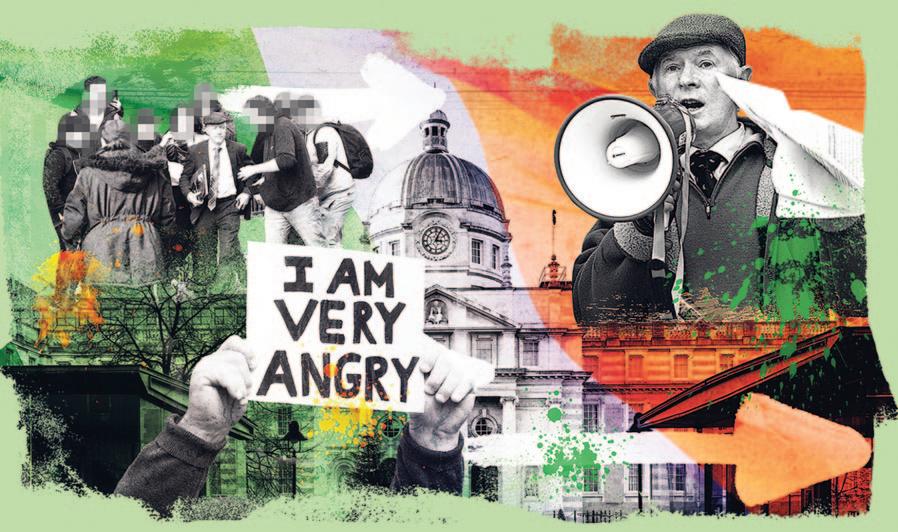
has also organised an electoral alliance of independent candidates.
Even before the elections, existing farright forces, of which there are hundreds of agents and provocateurs active daily online, organising in Telegram chats, have had an impact on Irish society – particularly on the question of immigration and refugees. Now, these forces are set on using these elections to both further spread their agenda of division, and to politically boost themselves by gaining more legitimacy. Should they win seats, their ability to do this will be strengthened.
The newer group on the scene, Ireland First, is a motley crew of self-titled “citizen journalists”, who try to whip up racist hatred; often organised and directed against refugee accommodation centres. In a recent tirade, party leader and ignoramus Derek Blighe stated that Helen McEntee should be put back in the kitchen. This incendiary comment illustrates the pathetic approach of the likes of Blighe.
idea that global elites, including the Irish establishment, are out to eliminate the “White Race”.
The right-populist trend
Other loathsome Ireland First candidates include Philip Dwyer, standing in the Euro elections in Dublin, known for a history of animal abuse (kicking dogs) and for using his social media platforms to spread racist and transphobic hate, as well as deranged conspiracy theories such as the Great Replacement – the
Other, less ideologically extreme but more opportunistic and likely to make an impact, are the right-populist groups like Aontú and Independent Ireland, both particularly aiming to build bases in rural communities. Aontú originated with leader Peadar Toibín’s socially conservative split from Sinn Féin over abortion rights, and Independent Ireland was founded by right-wing independent TDs Michael Collins, Richard
O’Donoghue and Michael Fitzmaurice, whose aim is to tap into the alienation within sections of rural Ireland, which includes highlighting tougher immigration policies.
O’Donoghue was once a Fianna Fáil member. It’s worth registering the point that there is a common gene pool with members of this new formation, and many other right-wing independents, and the traditional parties of Irish capitalism, Fine Gael and Fianna Fáil. In short they offer more of the same, with added racism and bigotry.
In Wexford, independent TD Verona Murphy, formerly of Fine Gael,
These groups and individuals are dangerous and want to set the clock back in Irish society for women and the LGBTQ+ community. They vilify people of colour and scapegoat poor immigrants and refugees for the problems in housing – directing people’s anger away from causes and culprits: the capitalist elites and their political representatives. They offer only despair and division and have no alternative on offer to those who are caught on the sharp edge of the housing crisis, struggling with cost-of-living, emaciated public services and so on.
These forces, whether right-populist or far right, are at their core creatures of capitalism – they uphold the rights of bosses, landlords and their system, which exists at the expense of the rights and wellbeing of the huge majority of workers and young people.
Only socialist politics and united struggle can improve the condition of the working-class majority in Ireland. Reject the far-right cretins at the ballot box this election!
THE UNITED Nations weather agency – the World Meteorological Organisation (WMO) – has confirmed that every major global climate record was broken in 2023, and they are set to be broken again in 2024. This means that the planet is rapidly approaching a critical threshold in climate change. Scientists have long warned about the irreversible damage or destruction to entire ecosystems once temperatures surpass 1.5C above pre-industrial levels. The data reveals a significant spike in warming last year, with average global temperatures now terrifyingly exceeding 1.58C above those levels.
This March was the warmest March on record, continuing a ten month streak in which every month has set a new temperature record compared with the corresponding month in previous years. This streak is set to continue well into 2024. The El Nino weather phenomenon, which naturally causes higher temperatures, plays a part in this. However, it is a recurring weather event, so the fact that temperatures are higher
than records began nearly two centuries ago prove that capitalism-caused climate catastrophe is the main contributor to these extreme temperatures.
The highest ocean temperatures ever recorded also occurred last year. Over 90% of the ocean area experienced a heatwave event during the year, with particularly extreme temperatures in the North Atlantic, which reached over three degrees above average temperatures. This has dire consequences for delicate marine ecosystems, as fish and other wildlife move north for colder water, as well as food systems on land, as warmer oceans fuel and exacerbate storms and rainfall.
The higher ocean temperatures have also resulted in a level of glacier retreat and Antarctic sea ice loss that has also exceeded all known records. The WMO report showed a substantial decrease in Antarctic sea ice, with the highest extent measured falling one million square kilometres below the previous record. This reduction in ice cover amounts to an area about twice the size of Spain. This has caused more

than a doubling of the rate of sea level rise over the past decade, compared to the period between 1993-2002.
All of these records, and more, are anticipated to be broken again and again in the years and decades ahead. The urgency of this crisis could not be
clearer. Nor can it be clearer that we can have absolutely no faith that the political or corporate leaders of the world can address this existential crisis.
The capitalist system promotes the
ruthless drive for profit above all else, which apart from all of the other economic and social problems this involves, is utterly destructive from the standpoint of nature. For example, companies are incentivised to use the cheapest possible processes and materials, such as fossil fuel-produced, non-biodegradable plastic. If one company chooses to actually ‘go green’ they will lose out to another who stays ‘dirty’, due to increased costs. Increasingly, therefore, ‘going green’ is simply a marketing ploy to give the illusion of sustainability.
Instead of this anarchic economic and environmental chaos, we need a radical shift to democratic economic planning. This must begin with taking the giant fossil fuel companies, like BP and Shell, into public ownership so their polluting can be stopped and their resources, including their workers, be directed to the task of transitioning to renewable energy production globally. Such a socialist plan of production would also end the waste of capitalist production that stems from competition, such as the duplication of goods and services, advertising, and spending on the arms industry.

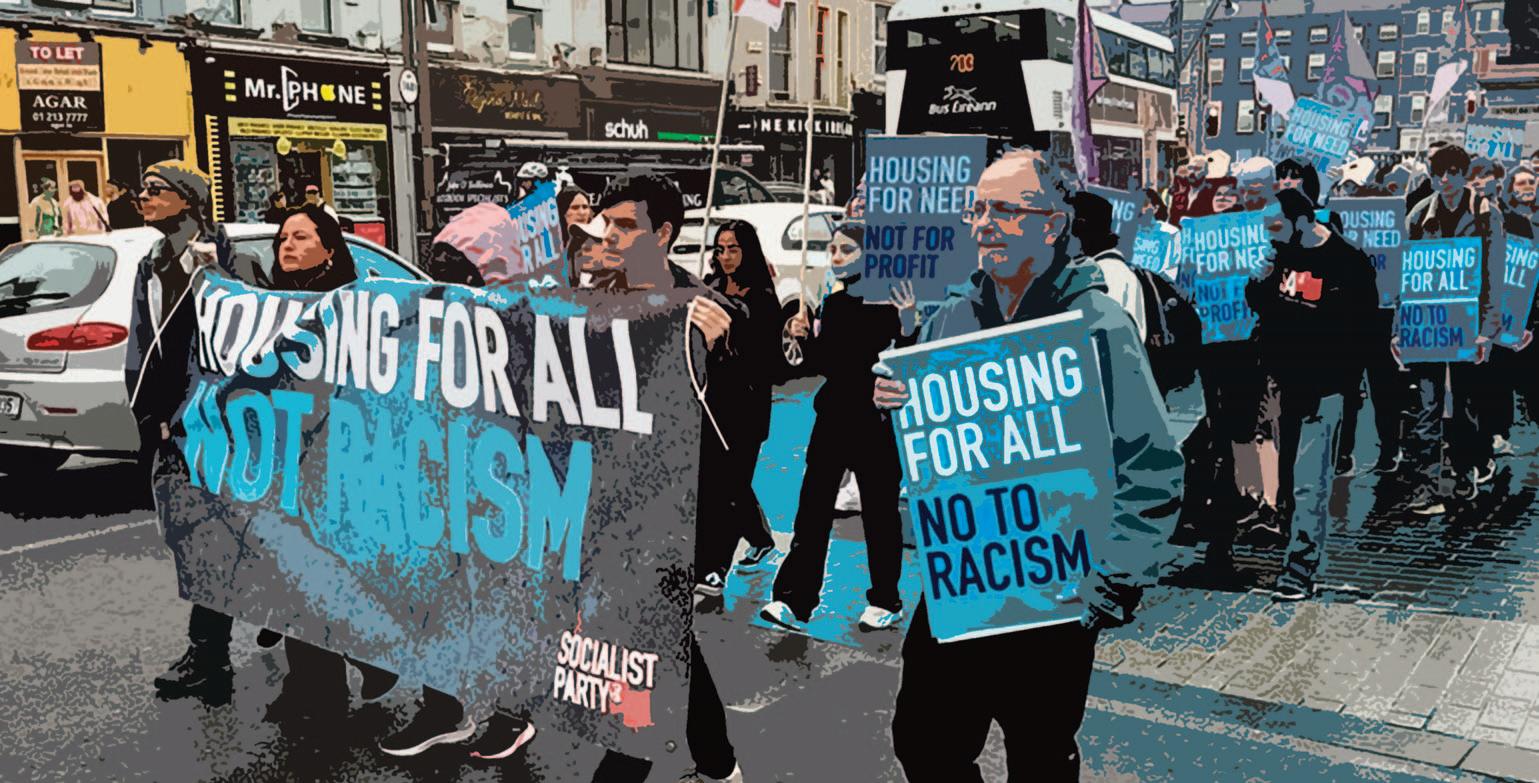
“The day has passed for patching up the capitalist system; it must go.”
James Connolly was right. The immense social, political and economic crises that dominate life in the 21st century all testify to this truth, but the climate emergency gives added urgency to its meaning. That’s why the Socialist Party stands for revolutionary socialist change, and why we are organising to bring it about. We support every right and reform that can improve life for working-class people, while fighting for what’s needed. We say: if capitalism can’t afford to provide for our needs then we can’t afford capitalism.
• All workers need double-digit wage rises. For a €17 an hour minimum wage.
• End precarity and bogus self-employment. For guaranteed hours with permanent contracts for all workers.
• A four-day work week with no loss of pay.
• Reduce the pension age to 60. A guaranteed decent pension for all.
• No layoffs. Open up the books and take large job shedding companies into public ownership, under democratic workers’ control and management, with compensation paid only on the basis of proven need.
• Repeal the Industrial Relations Act. For the right to organise and effective action.
• For a fighting trade union movement that organises the unorganised and mobilises the power of its membership. All officials should be elected, subject to recall and live on the wages of the workers they represent. Housing
• Reduce and freeze rents at affordable levels. Reinstate the eviction ban.
• For a major programme to build public homes. Take the big construction companies into public ownership. Seize vacant properties and unused land being hoarded for profit.
• Provide culturally appropriate accommodation for Travellers.
• Nationalise the banks and repudiate the odious debt. Reduce mortgage payments to affordable levels.
• End church control of schools and hospitals – full separation of church and state.
• For a major public works programme to build public schools, hospitals and childcare facilities.
• For a one-tier, national health service free at the point of use. Bring all private hospitals, nursing homes and pharmaceutical companies into public ownership.
• Free publicly-run childcare scheme for

every community. Extend fully-paid parental leave to two years and provide high quality early-years education.
• For 24-hour free counselling services and education programmes to begin to tackle the mental health crisis.
• Free education and training for all. Abolish the Leaving Cert system and provide a Third-level place for all who want one, with a living grant for all students. Build affordable, accessible student accommodation.
Environment
• For substantial investment in an expanded, reliable and free public transport system.
• End the reliance on fossil fuels – keep them in the ground. For extensive state investment in renewable energy, retrofitting homes and public buildings, and green jobs.
• For a just transition to a zero carbon economy, with no job losses or regressive carbon taxes.
• Take the fossil fuel companies, big agribusinesses and corporations into democratic public ownership to stop the destruction of our planet for profit.
• Oppose all forms of racism, sexism, homophobia and transphobia.
• For LGBTQ-inclusive, consent-based sex education in schools. Fully fund trans healthcare.
• Reduce the voting age to 16.
• Defend the right to asylum. End Direct Provision. Abolish all racist immigration laws.
• Black lives matter! Oppose far-right division!
• Fight to end gender-based violence, abuse and harassment in all its forms.
• For a socialist feminist movement that unites the whole working class in the struggle against oppression.
For workers’ unity in Ireland
• For the unity of the working class, Protestant and Catholic, North and South, in opposition to all forms of sectarianism, paramilitarism and state repression.
• For a socialist Ireland, with no coercion and the rights of minorities guaranteed, as part of a free, equal and voluntary socialist federation of Ireland, Scotland, England and Wales, as part of a socialist Europe.
End the rule of the billionaires
• Take the wealth off the 1%. For real progressive taxation on incomes, assets and profits to fund public services.
• Stop tax avoidance and evasion by the wealthy.
• Double corporation tax. End corporate welfare policies.
• No to all forms of privatisation in health, education, transport, housing, energy, sanitation, water and broadband provision.
For socialist change
• Capitalism produces inequality, environmental destruction and war. We need an international struggle against this system.
• Solidarity with the struggles of workers and oppressed peoples internationally.
• Oppose all imperialist powers, wars and occupations. No to NATO and EU militarisation. US military out of Shannon.
• No to corporate “free trade” agreements. No to the bosses’ EU and “Fortress Europe”.
• Build a new mass party that organises workers and young people in struggle against all injustices and for a socialist alternative. For a working-class movement to bring about a left, socialist government that breaks with capitalism.
• Take the key sectors of the economy – the monopolies in banking, industry, services, agriculture and big tech – into public ownership under the democratic control of the working class.
• Replace the capitalist market with a democratic socialist plan of the economy based on the interests of the overwhelming majority of people and the environment.